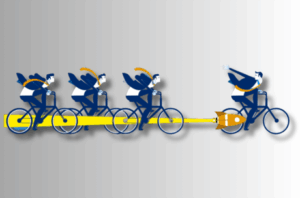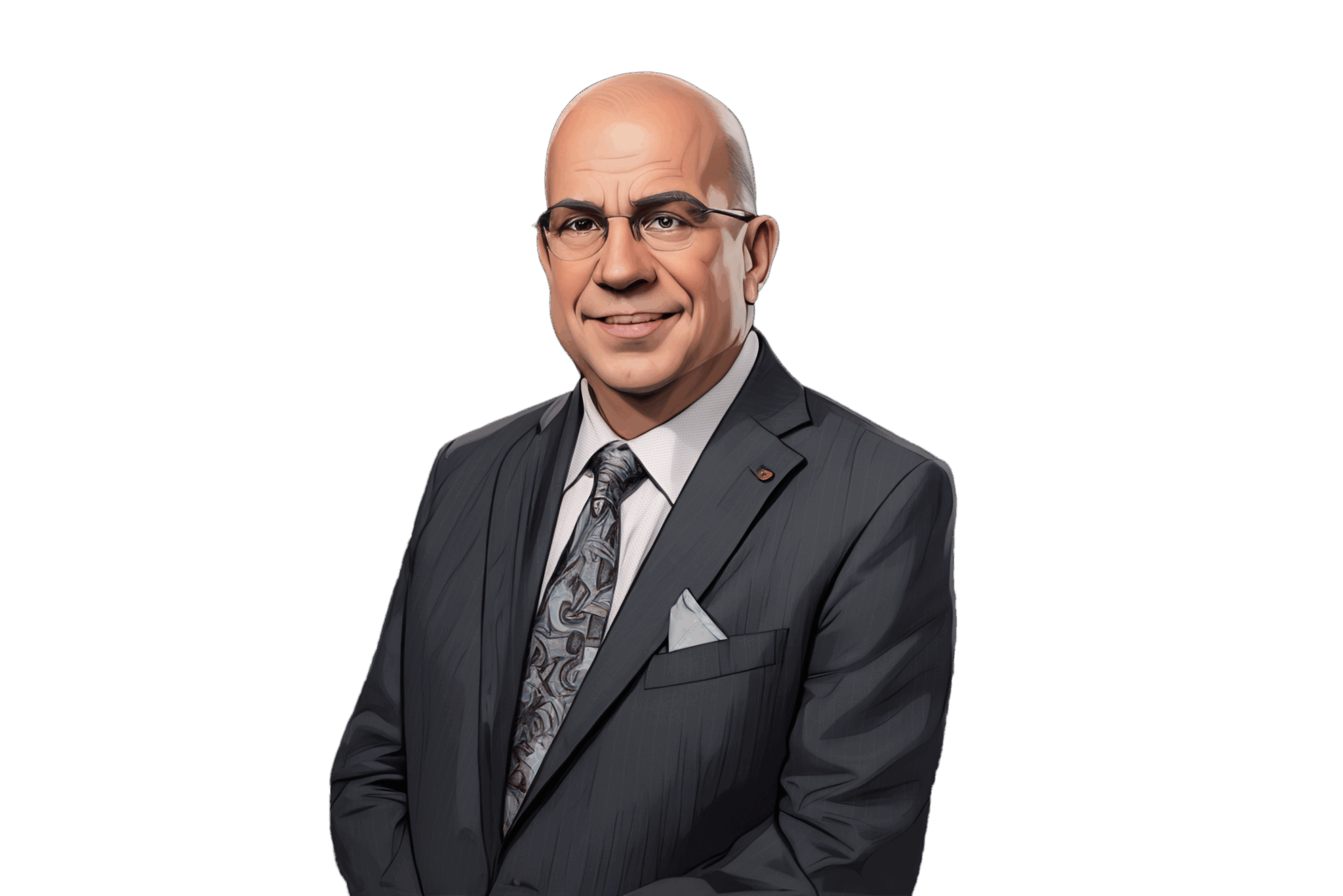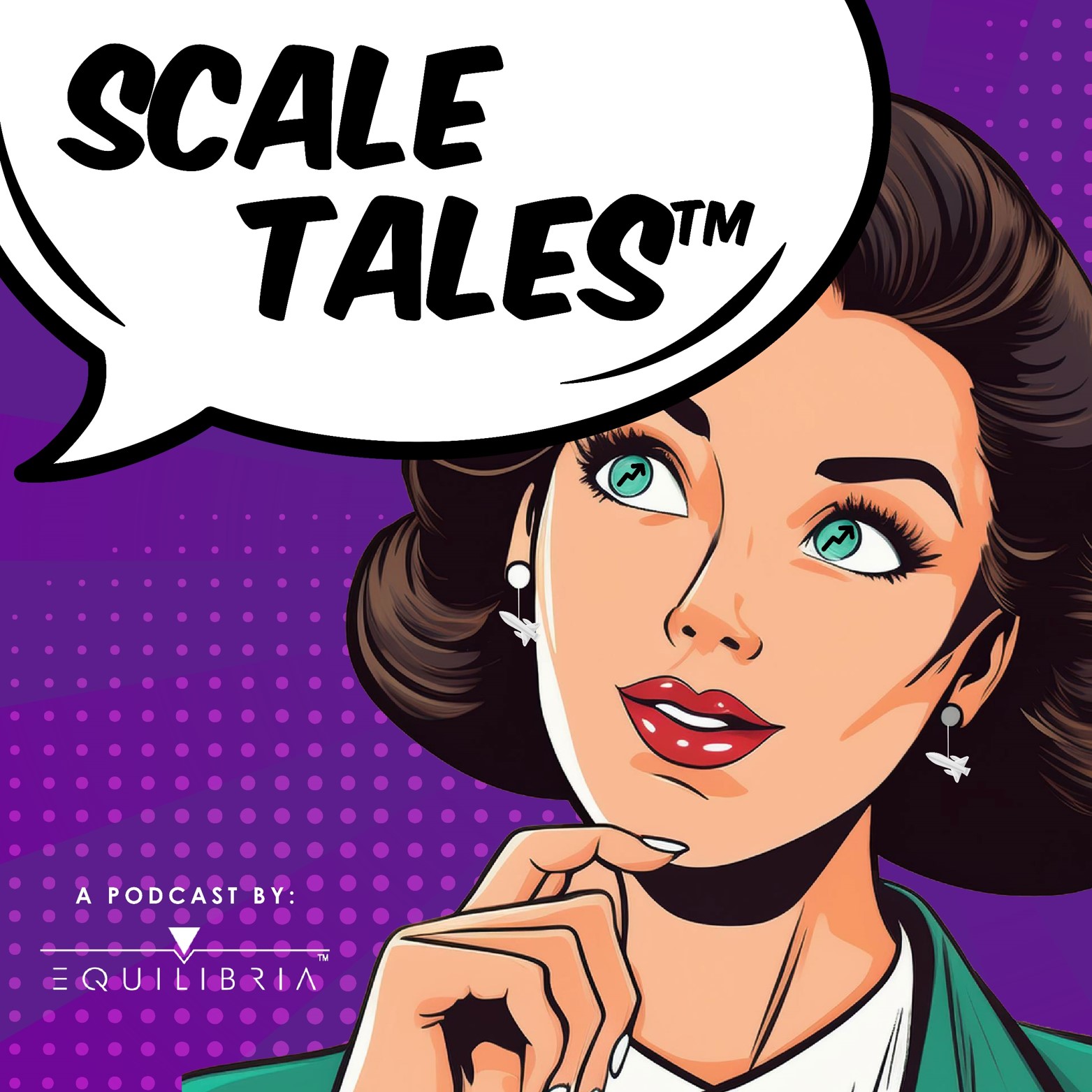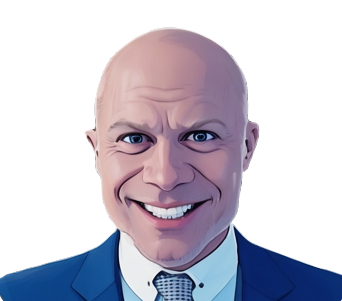Transcript
This podcast is brought to you by Equilibria, Inc. Did you know you can earn PDUs from listening to this show? It’s easy, accessible, and submitted directly to PMI. Keep listening to learn more.
Equilibria, Inc. Equilibria provides training to assist fast-growing companies in documenting and improving their key processes for maximum operational performance. Visit EQBsystems.com to stop the chaos of fast growth and start flowing today! EQBsystems.com.

Welcome to Scale Tales – the business storytelling podcast where entrepreneurs, executives and experts share firsthand accounts of those magical moments when they achieved something bigger than even they could have imagined.
I’m Alicia Butler Pierre and I love learning how others have successfully scaled something in their organizations. Whether it’s the founders themselves or the leaders and project managers inside the organization, one common thread I’ve noticed is the careful balancing of people and payroll. After all, you can’t build, grow, and scale something sustainably on your own.
You will need help. Building a team, whether they are full-time employees, independent contractors, outsourced help, or some combination one thing is for sure payroll is often the largest expense in an organization, doing it correctly means
everything. We’re about to hear from someone who specializes in payroll and, if you listen to the end, he has a free gift for you too!
This is Ep. 35: How Charles Read Scaled His Payroll Company to Seven Figures by Balancing Marketing and Operations.

Hello, I’m Charles Read, president and founder of Get Payroll and Custom Payroll Associates. I’m currently in Louisville, Texas and this is my scale tale.
It started in March of 1991. I had left J.C. Penney’s and went to work for a mobile accounting service as the COO. When the board was pushing the president to sell that, my wife and I bought it together, which solved a lot of the problems that entrepreneurs have in work life balance because we both worked all the time. So that was our life. It balanced out. Technology was changing. The mobile aspects of it began to disappear.
And we grew slowly. Word of mouth, some advertising. I pulled doors on the other sides of clients and hand out thing, but I’m a CPA and CPAs are not known to market well. If you go to a CPA conference, there’ll be a session for marketing and there’ll be 150 CPAs there. Two will try something and one will succeed. The rest just are getting their continuing professional education hours. So we moved along and grew nicely, slowly for a number of years. I took on a partner because we were doing accounting and payroll and that helped a natural growth.
My partner bought out the accounting practice and I kept the payroll side here about 10 years ago. Then about eight years ago I got busy with all that was going on and said I have to take one more hat off and put it on somebody else and give them that responsibility and authority. So I hired a marketing person because that was something I thought that I was good at, I could pass on to somebody else. I was busy with much more of the technical things that a CPA does.
So I hired Devon. Devon was a lady of a certain age, a couple of kids, an unhappy marriage, and I gave her the job of marketing. Now, as I said, I thought I knew how to market. Well, it took me about two weeks to realize I couldn’t market my way out of a paper bag. She had ideas and concepts and knowledge and expertise that I didn’t even imagine, let alone know. I was in the position as many of my clients are, not knowing what they don’t know. And that has allowed us to scale much more rapidly than we had been before and cross over that seven-figure mark and continue to move forward.
My idea of Facebook is it’s a way to send grandma pictures of the babies. I don’t have any use for it other than that, but I’m an old curmudgeon. So she developed our social media presence. Facebook, LinkedIn, later on Instagram, TikTok, you name it, we’re out there. We have our own YouTube channel now. We have hundreds of videos out there.
We have a Halloween one with the IRS as the Living Dead rising up from the graveyard. We have a parody on The Godfather and 2001 A Space Odyssey and other things, and then a lot of educational videos. So she brought all that into place. We hired a videographer who was
doing all the video work and editing and creating and writing scripts with her and so on. And that’s what has allowed us to continue to grow not as fast as I would like, but much faster than we had been and allowed us to be much more successful. So that’s really my tale, is that
marketing is the key to growth. And if you don’t know how to do it, find somebody that does.
Okay, there’s a lot to unpack here. First, isn’t Charles funny? But on a more serious note, I don’t know about you but as I listened to him, I couldn’t help but think that he probably did not need to do extensive marketing since every business will or should work with an accountant at some point. I asked him if that’s the real reason why many accountants might not invest heavily in marketing.
You know, I think that marketing is much more of an expressive attribute. If you’re an expressive personality, marketing becomes much more natural to you. CPAs are analytical. Just the facts, ma’am. Just the facts. Old Joe Friday on Dragnet. We’re very numbers oriented. We’re very form oriented. An income statement and a balance sheet. The balances make us happy.
Expressive people like to be with people, meet people, talk to people, share ideas. They are much more expressive about who they are and the business they are and the benefits that are there. CPAs, we know what the benefits are, and you should, too, and we don’t know how to explain that. So I think that CPAs as a whole don’t know how to market. Not only do they not know it’s not innate in them. They are hardcore analytical, professional nitpickers. Marketing to them is a strange, strange animal.
Of course it’s unfair to paint a group of people with a broad stroke
Now, I would try things that my brethren would not, and they were successful. And I thought I was a pretty good marketer because I would do things they wouldn’t and try things. And they worked. Not as much as I would have liked, but they worked and we grew and we were growing nicely. My wife was a people person, so I’d learned how to do it over many years.
And Devon just brought a level of knowledge and expertise that I had no idea existed. So yeah, CPA, payroll, these are things that everybody needs and they tend to get commoditized and they shouldn’t be. And how you break that cycle and show people that you have a unique selling proposition I think that it’s oil and water. Marketing and CPAs don’t mix well.
As Charles said, breaking through the noise when you provide a service or product that is commoditized is tough. Finding and capitalizing on your unique selling proposition (or USP) is key. It’s also key to have a great person on your team who can leverage various marketing channels to promote your organization’s proposition. Listen closely as Charles talks more about his payroll company’s USP.
We’re compliance experts. I’m a CPA. I’m also a US Tax Court Practitioner. There’s no other payroll company in the country that I know of that has a US Tax Court Practitioner on staff. Most of them don’t have CPAs on staff. So our compliance expertise is really unique in the
United States and that’s part of it. But if you can’t tell the story properly and get it in front of people, then it doesn’t matter. The old saw that if you build a men a mousetrap, the world will be the path to your door though you live in the deepest forest, that’s bunk!

You can build the best mousetrap ever created. And if you don’t present it out to the public, nobody’s going to buy it because nobody’s going to know about it. So, yes, we had systems and expertise and compliance that was superior to our competitors. But I wasn’t getting the story out. She could.
Thankfully it didn’t take Charles long to realize this just a couple of years after he and his business partner split their original practice. Remember, Charles’s partner kept the accounting practice while Charles kept the payroll portion and started a new company called GetPayroll. GetPayroll is a seven-figure business not by accident, but as the result of multiple strategic moves, including hiring Devon.
As the CEO, there’s a lot of things I have to do. And one of the things a good CEO does is delegate. My job is to delegate responsibility and authority to the appropriate person and then provide some oversight.
Now my job now is to solve problems for my staff and help bring in things that make them more efficient. They don’t let me do payroll anymore. Now I do the tax work I’m the guy that interfaces with the IRS because that’s my expertise. But the actual function of calculating the payroll and producing the checks and so on, they don’t let me do that anymore.
They know I’ll screw it up because we’ve changed systems and software and so on. So, I’ve got a great staff in operations that handles all that and I handle the tax stuff. As things grew and I had to delegate, that was what I chose to delegate at that point in time. And that was the best delegation I made.
I made others over the years as operations grew and administrative grew and I had people in place to do these things, but I kept marketing to myself and realized very quickly that that was a mistake, that I should not have kept it. I should have taken that hat off and put it on somebody else much, much earlier.
And once Charles hired Devon, the scale happened quickly.
The rate of growth literally jumped Within a month. Facebook is where we get the majority of our leads and we weren’t there.
This is interesting because, remember, Charles said earlier what he really thought about Facebook.
We weren’t doing anything with Facebook. I didn’t believe in Facebook. You know, I think it’s for sending baby pictures to grandma. I had gotten a LinkedIn account because I’d heard about it and explored it. Facebook to me was not a business thing, but it is a marketing thing and it markets to people who buy payroll. So, there you go.
We found that pay per click doesn’t work for us, but Facebook does. LinkedIn does some. Instagram does. YouTube does. We’ve got hundreds of videos out on YouTube now. And that’s all from Devon. She pushed the video side and now, I agree that video is a wonderful thing and we have a lot of fun with it. You can find my Charlie the Bartender series out there.
That was a lot of fun to shoot down at one of my clients, you know, the old curmudgeon bartender giving advice. So, we’ve had a lot of fun with it, but it’s been successful. We try things. If they don’t work, we try something else. Devon left and I replaced her with Anash. And he’s doing wonderful things, and we’re continuing to grow and add clients constantly now.
Listening to Charles’ scale tale, I can’t help but wonder – was his team prepared for the fast growth once it happened? Did they have enough people on their team? Did they have the processes in place to make sure everyone knew what work to do and how to do that work?
Well, I had learned years ago on process to have that documented fully. We have very, very extensive documentation of all the procedures and operations. And every time there’s a failure, we document it and change the procedure so we won’t get that failure again. This goes back to, you know, Six Sigma and checklists and other things that we’d implemented years earlier. So, the growth was not a great problem.
We had facilities and the software can handle much more than we put through it now with ease. Our biggest problems were the banks that we deal with and the amount of money. When we went from low millions of dollars a week to tens of millions of dollars a week and more bankers and banking, was our biggest problem, and we solved that. We used multiple banks and got through it.
But our operations people, because I’d always wanted the growth. I was prepared for it. We had the facilities in place, we had the systems in place, and frankly, it was not that difficult. And with changes in technology, we actually do more payrolls with less people now than we used to.
Sounds like Charles already had the business infrastructure in place that is, the people, processes, and technologies – to handle the fast growth. Coming up after the break, he’ll share more details about the ingredients that go into making his payroll company’s success sauce. This includes how he leverages his personal USP as well as some resources for you to consider in scaling your organization. And there’s even a free offer for you as a listener!
Are you a certified Project Management Professional? Just imagine, you can literally listen and learn while you earn credits. Yes, even while you’re taking a long walk, driving to or from work, even while you’re on an airplane. The good thing about our podcast episodes is that you don’t have to watch them in order to earn your PDUs.
In three easy steps – Visit ScaleTalesPodcast.com, sign up for a membership, take a short quiz and we’ll submit your credits to PMI. Yes, it’s really that simple and all at a price that makes this information accessible wherever you are. No gimmicks, no games. It’s really that simple! ScaleTalesPodcast.com.
Welcome back! Before the break, we met Charles Read, a refreshingly witty CPA who, although he was successful in building an accounting and later payroll-only company, learned the value of great marketing. That great marketing led to his company, GetPayroll scaling to seven figures. Now, Charles will tell us more about GetPayroll, the unique work he does as one of the few U.S. Tax Court Non-Attorney Practitioners in the U.S., and some sage advice for being in business over 45 years. Here’s Charles.
Get Payroll is a service. We use software that we license. And what we do is if you have employees or you are an employee in your own corporation, we’ll take that information of the hours, the salaries, the rates of pay. We’ll calculate all the payroll. We’ll calculate all the taxes, all the deductions, handle garnishments, anything else that comes up, and then we produce the paychecks for all the people.
We prefer direct deposit, of course, but there are manual paychecks still. We make all the deposits to the regulatory authorities, the federal and the states and the local if need be. We file all the reports, and we handle all the problems that arise. Because the IRS makes millions of mistakes a year. It’s 100,000 civil servants utilizing technology, some of which goes back to the 1960s, and they issue billions of dollars of penalties, many of which are invalid.
So we’re the people that can solve that. 40% of all small businesses will be hit with an employment tax penalty this year. So, if you weren’t penalized last year or the year before, you’re due this year. That’s an ongoing thing. We get mail from the IRS all the time. As a CPA, I take a Form 2848, Power of Attorney, which allows me to advocate for my clients with the Internal Revenue Service.
I’m one of the very few payroll companies that will do that because it’s professional responsibility. And I take on that professional responsibility as a certified public accountant to provide that service for my clients. So we negotiate things with the IRS all the time. We talk to them, we deal with them. I spent three years on the IRS advisory council in D.C. helping them solve problems and, and work through things that were outside of their expertise because of the bubble they live in.
They bring in a couple of dozen businesspeople and lawyers and CPAs and so on every year for a three-year stint to work through problems that the IRS can’t solve internally because they don’t have the expertise. So that was a lot of fun. Got to meet a lot of people. But we
solve problems that the IRS creates. We also have problems our clients create and there’s the occasional one we create, but then we won’t talk about that. So it’s a lot of fun, for me! I enjoy the back and forth with the Internal Revenue Service. And as my lawyer used a phrase years ago, it’s kind of like playing high stakes poker with somebody else’s money.
It’s not everyday that you meet people who say they enjoy going to battle with the IRS. In case you’re wondering, the IRS stands for Internal Revenue Service. This is a U.S. government agency that individuals and businesses report their income to. Every accountant at some point deals with the IRS on their client’s behalf, but not all of them can represent their clients in court. Charles can. In fact, his role as a U.S. Tax Court Non-Attorney Practitioner makes that possible. It’s his personal USP.
There’s about 270 of us in the country total and you have to go take an exam at the U.S. Tax Court. They give it once every two years in person in D.C. and you have to understand evidence, rules of procedure, legal ethics and substantive tax. Most people don’t pass the test. What this allows me to do is practice in the United States Federal Tax Court. Even though I’m not an attorney, I have a bar card from the Tax Court.
I am able to represent people directly in that Tax Court as if I were an attorney. I don’t charge like an attorney. When everything else fails and the IRS has screwed things up royally and we’ve gotten down to the point where they send you their 90-day letter saying pay this or else. And at the end of that 90 days, it’s over, it’s done, you owe that money regardless of whether you really owe it or not. That’s that final notice of determination.
Well, that notice of determination is your ticket to Tax Court. We take that and we file a petition with the U.S. Tax Court and we get a whole another bite at the apple. We get very sophisticated people, very knowledgeable people, tax attorneys that are working for the IRS, in the most part, they’re district councils who look at these things and solve these things. On top of that, 95% of all U.S. Tax Court cases get settled pre-court. So, we’re going to get a settlement offer if nothing else.
But most of the time, we don’t take it to Tax Court unless we think we have a case. Obviously, we don’t take frivolous cases to Tax Court. That’ll get you into trouble. So, we have a case, we think we’re right. We take it to Tax Court because it’s gotten mired in the gears of the IRS and they’re not turning anymore for whatever reason. And we take it to Tax Court, and we’ll get a whole new view at it by somebody entirely new that looks at it and says, “Okay, let’s look at this. Does this make sense?”
And in many cases, District Council looks at that and says,
“Charles, I don’t know why they did that. We’ll take care of it. I’ll send you a letter.”
That’s what happens most of the time for our cases, because most of what we’re litigating is problems that the IRS has created. I’ve got several on my desk right now. One of which the IRS says, “Well, you never filed these forms.” I have the receipt back from the IRS saying, we filed them on a timely basis. We’ve sent that to the IRS at least six times.
They still say, “You got to pay up or else.” So we filed a Tax Court case, and I’m talking to the District Attorney, District Council now, and she’s going,
“Oh God, what the hell they do?”
So, you know it’s fun, and it gives me the capability of doing things for my clients that my competitors can’t or won’t at a fraction of what a tax attorney, he’s going to want a $5,000 retainer up front. It doesn’t need that. It just needs somebody to talk to, file a $60 petition and talk to District Council. We do this all the time in appeals.
We had one case that took nine years to solve, and I solved it by calling the deputy chief of appeals in D.C. and telling her that the guy who worked for her won’t return his phone calls. And she said,
“I’ll have him call you.”
And he called me, and we solved it. And three months later, my client got a $400 refund instead of a $95,000 penalty
Wow!
The IRS makes mistakes all the time it’s terrible. It’s lack of training, it’s lack of technology. Silos don’t talk to each other. So paperwork is just incredible. That’s a horrendous thing. I wouldn’t want to run that on a bet.
I must say this is a unique competitive advantage indeed! Does Charles only represent his payroll clients in tax court or does he also represent others who are not necessarily existing clients?
I’ve done a couple, but really I don’t seek them out. We don’t market those services to the public. Even when I was doing accounting, we didn’t market retail tax because we did taxes for our clients and for their families basically and for some of their employees. We had plenty on our plate. We didn’t want to be a retail tax shop. I don’t want to be a retail U.S. Tax Court Practitioner. I’ve toyed with that idea, but at my age, probably not.
In case you haven’t noticed, this is another of those ingredients in Charles’s success sauce – becoming niche or having a strong focus and not attempting to be all things to every customer. But it does make me wonder if another ingredient is partnerships.
Absolutely, I have partners. If it’s a tax situation, my ex-partner who still offices with us would love to talk to you. I have bookkeepers that we can send you to. We work with workers comp companies, we work with benefit companies, we work with HR companies. We provide HR services through them online with our clients. So, anything that’s payroll or payroll related we can help you with.
We’ve tried to become a one stop shop for everything payroll related and some of the business things that are just tangentially related to payroll, well, we can help you with those too. But I’m not going to come market your restaurant and I’m not going to come teach your dog groomers how to shave a dog.
There’s that sense of humor again.
That’s part of the package. I’ll probably tell you a joke on the phone.
Beyond the jokes he willingly shares, I asked Charles if there are some specific resources he can recommend. Resources that can assist you with scaling your operations, revenue, impact, or all of the above.

One of the keys to growing a business is to work on the business, not in the business. Most entrepreneurs create a job for themselves and that’s fine. You start a business because you think you can do it better, faster, cheaper than somebody else, and that’s great. But you’ll only grow so much with that. Michael Gerber in The E-Myth Revisited…
That book was given to me years ago and, it saved my business. I was ready to fire everybody and move it back into the game room. It taught me how to work on my business. And ever since then that’s what I have been doing is working on my business.
Yeah, I do some technical things inside and I have a job in there, but my focus is to work on my business and grow my business. Okay. The E-Myth Revisited. Michael Gerber. Everyone of my employees reads it when I hire them, I buy it by the dozen to give it out to clients. Now I read Tom Peters. I read business books all the time. But that one single book, if you’ll read that, and I reread it every few years. I’ve probably read it 15 times now. And every time I reread it, it reinforces and brings things to mind, will allow you to grow your business more than any other single thing as far as a reference, as far as a course, as far as a tool. That to me is the most impactful thing I have ever seen.
Speaking of business books, Charles has also written several himself.
My most recent book is The Payroll Book. The title wasn’t taken. I don’t know why, but I grabbed it. It’s a guide for small businesses and startups. Wiley and Sons published it and helped make it a much better book than it would have been by myself. And it’s available for your listeners if they would like a copy. Go to thepayrollbook.com and use the discount code “podcast.” We will ship them a free copy. No shipping, no handling, no nothing. We’ll ship them a copy. It’s a wonderful thing to have on the bookshelf for payroll and payroll-related matters. And if you’ve got problems that the book can’t solve, my number’s in the book.
Wow, another free gift from a great guest. I hope you will take advantage of Charles’ free offer. Before we wrap up, here’s a recap of some important lessons learned from his scaling journey to a seven-figure business.
- Marketing is expressive. Obviously, we can’t paint people with a broad stroke but in general, if you know you are not a creative or expressive person or maybe sales just isn’t something you’re very good at, then hire someone who is expressive, outgoing, and creative. It can literally make a difference between growing from a five or six-figure business into a seven-figure business.
- With that in mind, operations is still required to sustain scale. Marketing may get the customers through the doors of your organization, but operations will keep them there.
- If you can’t articulate your story and your USP, unique selling proposition, and get it to the masses, your business or project will suffer.
- As the CEO, or project manager, don’t attempt to do all the work yourself! Delegate to SMEs (subject matter experts), then empower them with the tools to do the work efficiently.
- Beware of software, social media, and systems stereotypes. How’s that for saying four s-words in a row? Seriously, educate yourself. Remember that stereotype Charles had about Facebook? And now look, Facebook is the main source of leads for his business.
- If you stay ready, you don’t have to get ready. Because Charles had a technical mind, he already understood the importance of documenting processes, building business infrastructure, and investing in quality frameworks like Lean Six Sigma. So when the fast growth happened, they were ready for it!
- Don’t fear technology, invest in it! Use it and leverage it to streamline your operations to maximize profitability.
- Concentrate on your strengths and competitive advantage. Don’t dilute your efforts.
- Stay in your lane! Being all things to all people will cause confusion and a confused mind will not buy.
Mr. Charles Read, thank you! You may not consider yourself expressive, but I argue that you are! Your humor got us through what I’m sure many people might consider to be a dry topic. We appreciate the resources you shared, especially the offer to get a free copy of your book!
We will have links to Charles’ company, GetPayroll, as well as links to their YouTube, Instagram, and TikTok channels in this episode’s show notes. We’ll also have the link to request a free copy of his book too! Visit ScaleTalesPodcast.com to access this information. ScaleTalesPodcast.com.
If you are a PMP interested in earning a PDU for listening to this episode and others, then visit ScaleTalesPodcast.com. Once you’re there, click the button that says, “Get CEUs/PDUs Credits,” sign up for a monthly membership, and we’ll make sure we submit your earned credit to PMI.
Thank you for listening! If you learned something valuable from this episode, please
leave us a five-star rating and review wherever you’re listening.

I’m Alicia Butler Pierre and I produced and narrated this episode. Audio editing by Olanrewaju Adeyemo and Sabor! Music Enterprises. Music production and original score is also by Sabor! Music Enterprises. Video editing by Gladiola Films. And the show notes are by Hashim Tale.
You’ve been listening to Scale Tales, a podcast by Equilibria, Inc.











